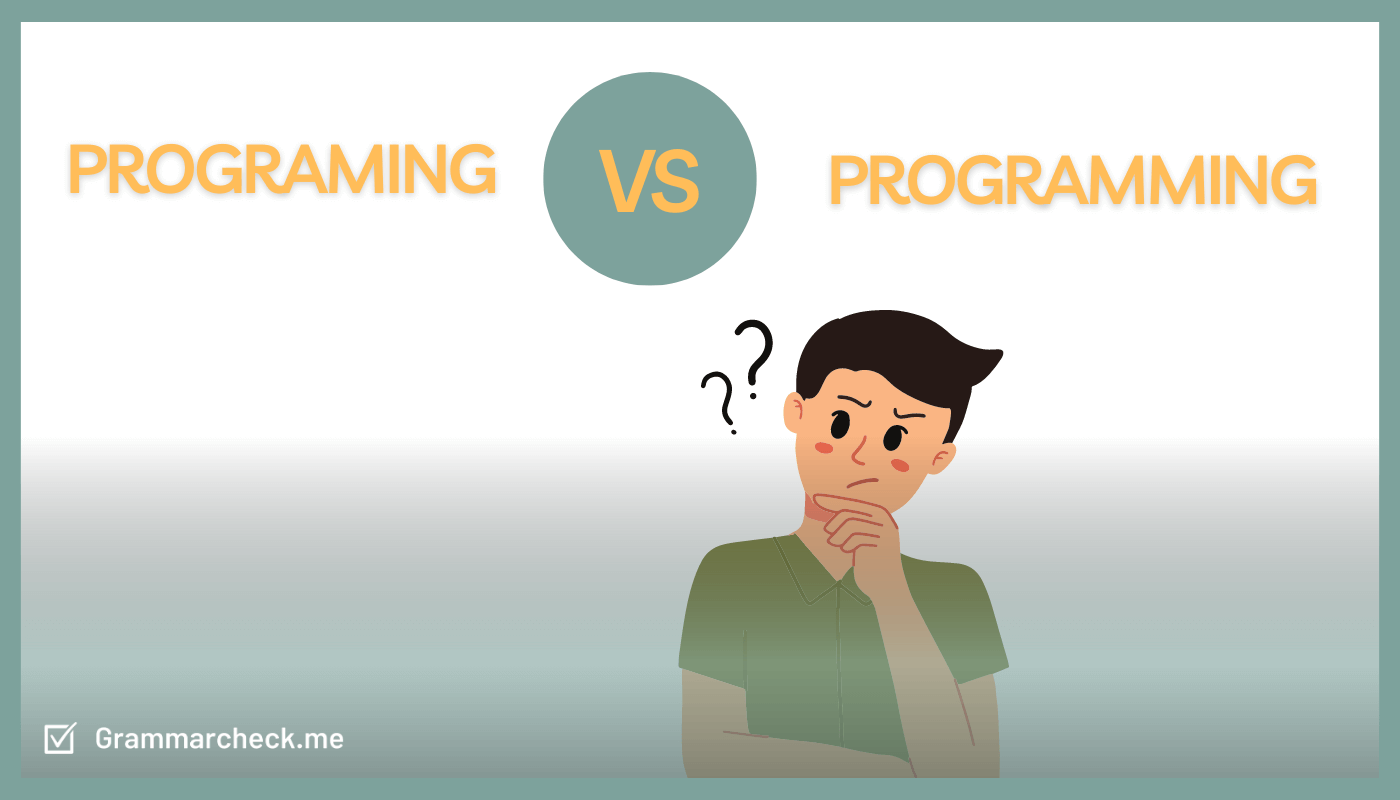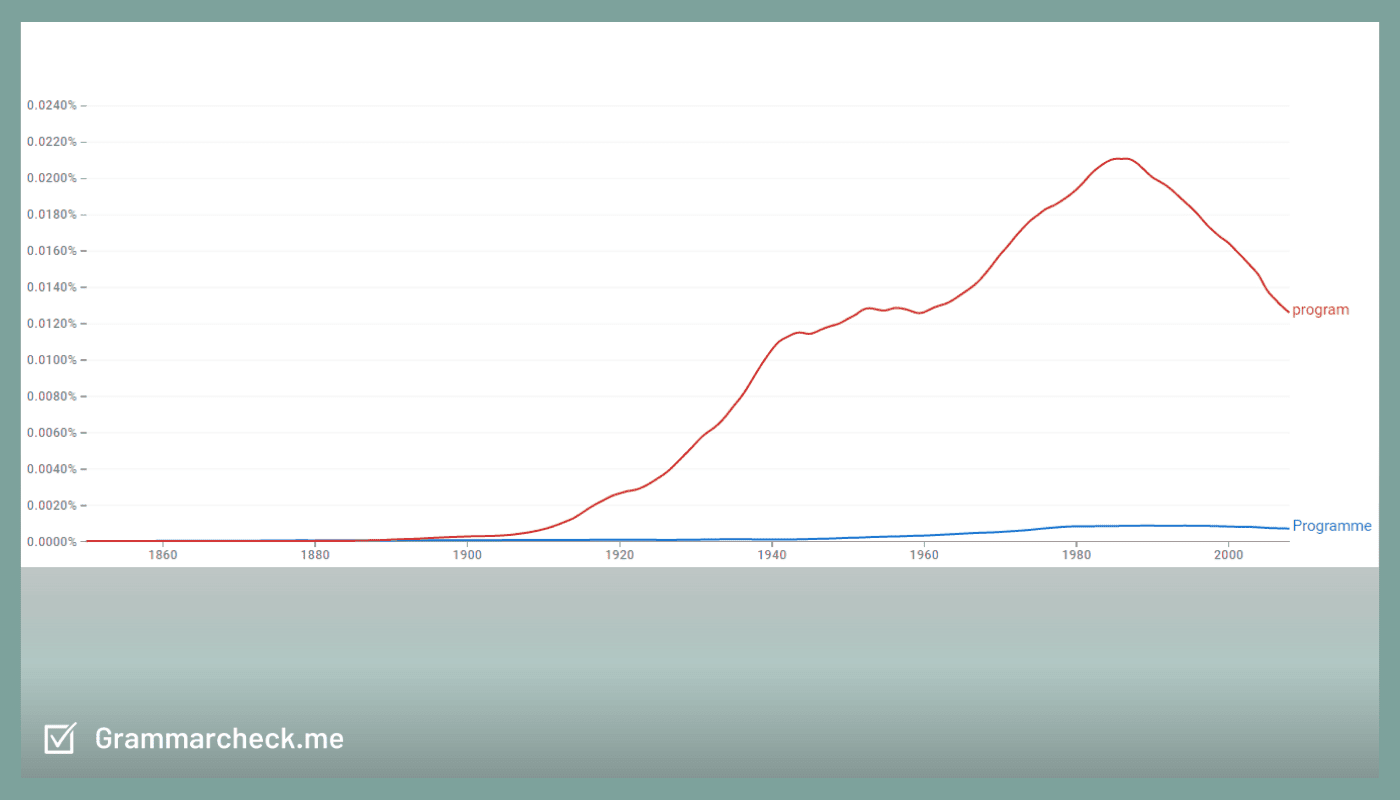Confused about whether it’s spelled “programing” or “programming”? Find out the truth in this article.
One of the most challenging parts of learning English is figuring out how words are spelled. Unlike other languages that closely adhere to phonetics in their spelling, English has more exceptions than actual rules when it comes to both grammar and spelling.
The result is a number of words that many people have trouble spelling. This is especially true when figuring out whether a letter in a word occurs once or twice – especially if the word phonetically sounds the same either way. One example is whether it’s “programing” or “programming.” These are two of the most frequently confused words!
In this article, you’ll learn the proper way to spell this common word and why both spellings are often confused.
Is It Spelled “Programing” or “Programming”?

Let’s jump right into answering the main question: is it “programing” or “programming?”
Takeaway: When it comes to whether it’s “programing” or “programming,” the proper spelling of the word is the latter – “programming.” That said, you may have seen the word spelled as “programing” in the past.
The two spellings are often confused, and some may use the spelling “programing,” but it is generally accepted as incorrect. Just like we saw with our comparison of the words tomatos and tomatoes, many writers get this spelling incorrect!
The most challenging element to understand regarding the word “programming” is why it’s spelled the way it is spelled. “Programming” is the verb “program” in the present participle form. Based on fundamental English grammatical rules, the spelling “programing” makes sense, as in general, you simply have to add -ing to a word to make it present participle.
However, there is an exception to this rule for verbs that end in a consonant but are preceded by a single vowel, such as in the word “program.” When this is the case, the final consonant is doubled to form the present participle form of the word.
So in the case of “program,” the “m” is doubled before adding the -ing to the end to create the word “programming.”
Other examples of this rule in action include:
- Plan = planning
- Run = running
- Slap = slapping
You’ll notice that a significant number of English verbs follow this structure, so you should be prepared to apply this rule frequently. However, there are additional rules for verbs whose last two letters are not a vowel followed by a consonant.
Just be sure to pay close attention to spelling! We saw in a recent comparison of the words using vs useing that many writers make mistakes on simple terms!
Rules for the Word Programme

While in North America, the root word is typically spelled “program,” across the pond in the UK, you may find that the British English spelling is sometimes “programme.” The word’s meaning is the same; it’s just the British spelling that is different.
In this case, the rule differs, as the root word now ends with a vowel. If the root word already ends up with a vowel, all you have to do is drop that vowel and add -ing to the end of the word.
In applying these rules, we still end up with the same word in present participle form: “programming.”
Other examples of this rule in action include:
- Jump = jumping
- Crash = crashing
- Bend = bending
As with the previous rule, this is another common rule to follow when turning verbs into their present participle form.
The lesson here is that “programing” is never an acceptable spelling of the word. No matter where you live and whether the root word is spelled “programme” or “program,” the meaning is the same, and the present participle spelling of the word is “programming.” And just like we saw in our comparison of the words spelled and spelt, even simple words can cause confusion!
Now, let’s talk about what the word “programming” actually means so that you can properly use it in your writing and speech.
What Does Programming Mean?
The word programming is a form of the verb “program.” The word “program” is also a noun, which may refer to either a set of activities or a series of coded software.
Similarly, there are essentially two definitions for the word “programming.”
Let’s start with the first definition. Programming is a computer term that means creating a set of instructions that tell a computer how to perform a given task. The term is usually used to mean programming using a computer language or coding language.
Here’s an example of this use of the word in a sentence:
- IT is programming my new computer right now.
The second definition is the task of scheduling something, most commonly related to entertainment or media.
Here’s an example of this second use of the word in a sentence:
- We’ll resume our regularly scheduled programming after these messages.
Just like we saw in our post about openned or opened spelling, even a small spelling or punctuation change makes a huge difference!
Takeaway: No matter which context you’re using the word in, you can describe programming as the process of developing a program.
Frequently Asked Questions
Programme is the British variant of the word program. Programme is commonly used in the UK, but very rarley used in the USA.
No, programming and computer programming are not the same. Computer programming specifically deals with various computer language models. However, programming consists of creating algorithms, different math models, data processing, and various data structures.
Imperative languages and declarative languages are the two main types of programming. More specifically, both are types of computer programming
Final Verdict
The common misspelling of “programming” is the perfect example of the grammar rule when conjugating verbs into their present participle form. To recap, here’s the rule to follow:
- If the verb ends with a vowel followed by a consonant, double the final consonant, then add -ing.
- If the verb ends with two consonants, simply add -ing.
The one that you should take away is that between “programing” and “programming,” the proper spelling of the word is “programming.”
